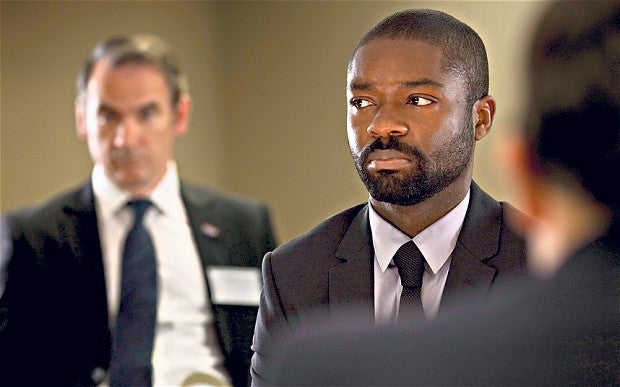TV review: The security services can't win either way in Complicit, Channel 4

If you think that MI5 is all Berettas and beautiful women, Guy Hibbert wants to disillusion you. Complicit, his drama about the arrest and interrogation of a Muslim radical, begins with a pointed mismatch between sound and vision. On the soundtrack you have the inflammatory rhetoric of an Islamist preacher.
On screen – apart from the occasional glimpse of the YouTube videos to which the ranting is attached – you have a blankly anonymous office space. Fax machines and photocopiers churn away, making sure that the paperwork of intelligence is all up to date. And sitting there pushing files is Edward, a desk officer with a beleaguered air of vigilance.
You can understand why Edward looks so fretfully anxious. Like Carrie Mathison in Homeland, he lives in dread of missing an important detail, because missing it might mean that people die. And currently all his anxieties centre on a surveillance target called Waleed, the hate-preacher in those videos and a man who Edward believes is primed for action. “I think I might be seeing something that isn’t there,” he says, but really he’s terrified that his superiors might not be seeing something that is. There’s a faint air of condescension when he pushes his suspicions up the line, a sense of exasperation when a request for further surveillance is reluctantly granted.
The real drama of Complicit lay not in the tracking of Waleed though, but in what happens when he’s finally pulled in, arrested in Cairo after a trip that’s also taken him to Yemen, in worrying proximity to a known terrorist. It looks as if Edward’s theory has been vindicated. Waleed has been caught with men who’ve confessed to helping to manufacture ricin. But there’s a problem. They’ve retracted their confessions and Waleed himself is now playing the indignant victim: “I’m a British citizen and it’s your job to look after my constitutional rights,” he tells Edward and a local intelligence man, Tony. He also claims to have been tortured, and knows where that leaves his questioners.
So, does Edward play by the rules, many of which also play into Waleed’s hands, or does he take up an Egyptian security man’s offer of some back-channel persuasion? In a tense, extended scene (beautifully acted by David Oyelowo and Arsher Ali), Waleed and Edward spar, probing for each others weak points. And it’s Waleed, with his detailed knowledge of interrogation protocol who appears to win: “It’s already out there in the UK, ready to go,” he tells Edward tauntingly, “but that might not be true. It might all be in your imagination... that’s what terror is.” Edward breaks and gives the torturer the go-ahead. Within a day they have an address in the UK and – after Edward has done some more investigation – apparent proof that ricin was being manufactured.
This looks initially like a classic ticking-bomb justification for torture, underlined by the Egyptian colonel’s earlier question to Edward: “Do we follow instructions or do we do what is right?” But the strength of Hibbert’s piece was the way in which it acknowledged that the security services can’t win either way. “Bad things are coming to you,” says the injured Waleed as he’s led away, making you question the extent of his trauma. The address he’s given up turns out to be false as well. So where 24 repeatedly presented viewers with torture as a heroic shortcut, this showed it as a potential snare, and one that fanatical men know how to use. “Mr Waled Ahmed has been devastatingly cunning and you have been devastatingly careless,” says Edward’s MI5 boss as she tells him he’s got to go. And even then you wondered whether his real crime as far as the service is concerned was to be found out. Hibbert’s drama was about uncertainty, and perhaps the best thing about it was that it will have left viewers uncertain and unsatisfied themselves. That’s what terror is.
Subscribe to Independent Premium to bookmark this article
Want to bookmark your favourite articles and stories to read or reference later? Start your Independent Premium subscription today.

Join our commenting forum
Join thought-provoking conversations, follow other Independent readers and see their replies